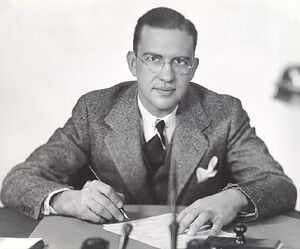Difference between revisions of "John Corson"
(unstub) |
m (Text replacement - " had served as " to " had been ") |
||
| Line 23: | Line 23: | ||
He also had taught international affairs at [[Princeton University]]'s [[Woodrow Wilson School]] and served on a presidential commission on federal salary levels in the 1960s. He was a past president of the American Society of Public Administration and the American Blood Commission.<ref name=Wapo/> | He also had taught international affairs at [[Princeton University]]'s [[Woodrow Wilson School]] and served on a presidential commission on federal salary levels in the 1960s. He was a past president of the American Society of Public Administration and the American Blood Commission.<ref name=Wapo/> | ||
| − | Over the years, he also had | + | Over the years, he also had been trustee or director of Marymount College, George Mason University, the Wolf Trap Foundation and the Educational Testing Service. He was the author of a dozen books on government and administration and had contributed articles to the New York Times magazine, the Atlantic and the Harvard Business Review.<ref name=Wapo/> |
{{SMWDocs}} | {{SMWDocs}} | ||
==References== | ==References== | ||
{{reflist}} | {{reflist}} | ||
Latest revision as of 23:08, 2 August 2022
(academic, bureaucrat) | |
|---|---|
 | |
| Born | 1905 Washington DC |
| Died | 2 September 1990 (Age 84) Arlington, Virginia, US |
| Nationality | US |
| Alma mater | University of Virginia |
| Interests | McKinsey & Co. |
Part of the US governing set, in and out of government,academia and private business. | |
John J. Corson III was an economist, author, former government official and newspaper executive.[1][2]
Career
He was born in Washington and grew up in Philadelphia. He was a 1926 graduate of the University of Virginia. Corson came to Washington in the mid-1930s. Over the next decade, he served as assistant executive director of the Social Security Board 1936-38, then director of its old age and survivors insurance bureau 1938-41 and 1943-44. [3], and deputy director of the U.S. Employment Service. He also had worked for the National Youth Administration and the National Recovery Administration.[4]
He was deputy director general of the United Nations Relief and Rehabilitation Administration in 1944 to 1945. He then spent five years with The Washington Post, where he was research director, circulation director and assistant business manager. From 1951 to 1966, he worked for the mangement consulting firm McKinsey & Co., where he was managing partner of the Washington offices.[4]
Corson was an adviser to the secretary of Health, Education and Welfare from 1966 to 1968; board chairman of Fry Consultants Inc. from 1969 to 1973; and a consultant to foreign governments and international organizations from 1974 to 1983.[4]
He also had taught international affairs at Princeton University's Woodrow Wilson School and served on a presidential commission on federal salary levels in the 1960s. He was a past president of the American Society of Public Administration and the American Blood Commission.[4]
Over the years, he also had been trustee or director of Marymount College, George Mason University, the Wolf Trap Foundation and the Educational Testing Service. He was the author of a dozen books on government and administration and had contributed articles to the New York Times magazine, the Atlantic and the Harvard Business Review.[4]
Event Participated in
| Event | Start | End | Location(s) | Description |
|---|---|---|---|---|
| Bilderberg/1971 | 23 April 1971 | 25 April 1971 | US Vermont Woodstock Woodstock Inn | The 20th Bilderberg, 89 guests |